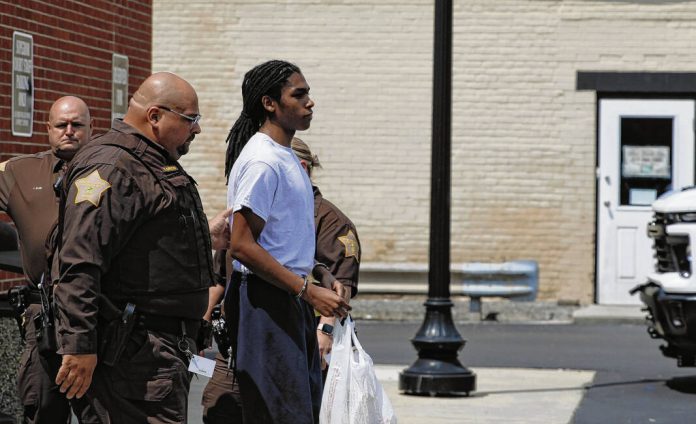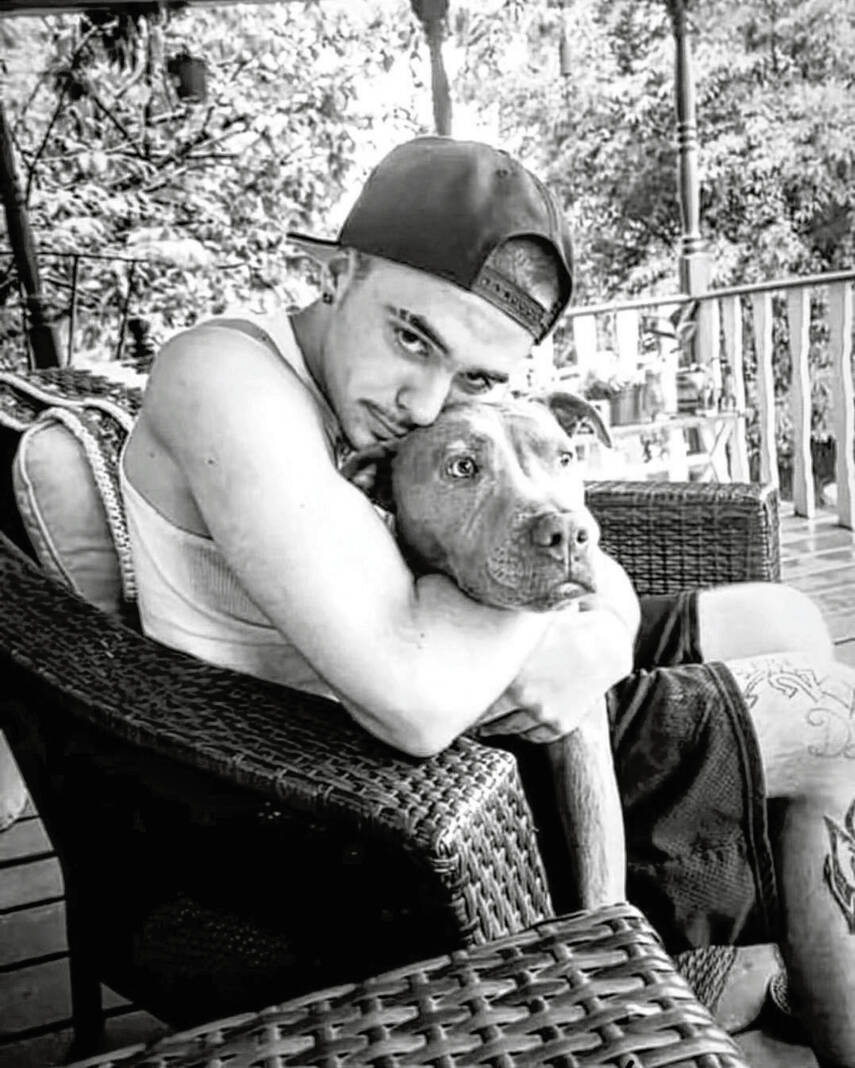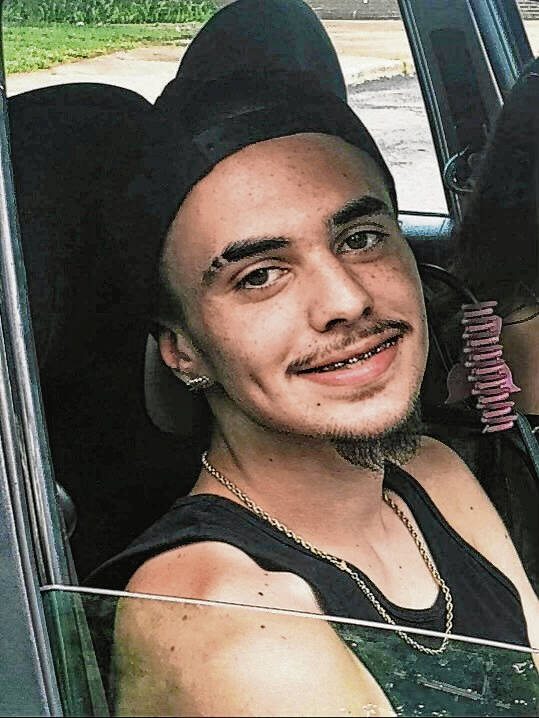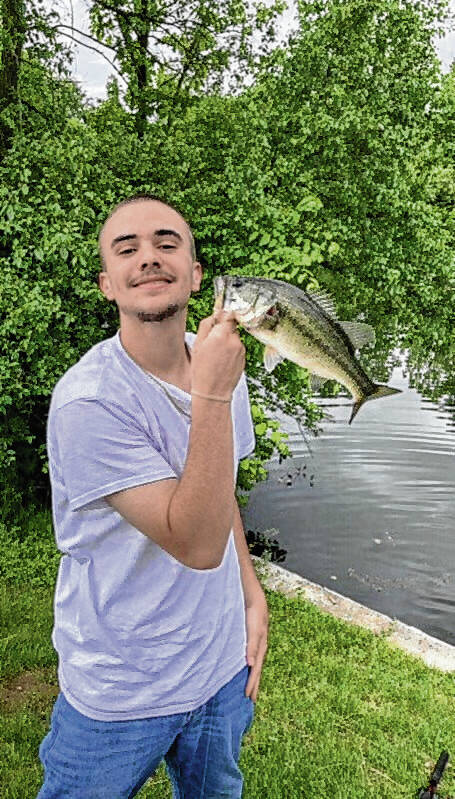A Greenwood teen will serve 55 years for killing an Indianapolis man during an alleged drug deal-turned-robbery.
Quincy D. Stringer Jr., 17, was sentenced to 45 years in prison Friday for the murder of 18-year-old Ethan J. David on Dec. 10, 2023. He will spend an additional 10 years on supervised release, and was ordered by Johnson Superior Court 3 Judge Douglas Cummins to undergo mental health treatment and to finish his GED.
Stringer pled guilty to felony murder on June 28, which was formally accepted by Cummins on Friday. The plea was open, meaning Cummins had the final say on Stringer’s sentence. The charge carried a possible maximum of 65 years, a minimum of 45 years and an advisory sentence of 55 years.
While Stringer was a juvenile at the time of the murder, the Johnson County Prosecutor’s Office charged him as an adult under Indiana law. During the three-hour sentencing hearing Friday, Cummins heard testimony from Greenwood Police Detective Bryce Link, Johnson County Juvenile Detention Director Kristi Bruther and David’s family.
Johnson County Prosecutor Lance Hamner was pleased with the sentence and investigation, adding that his office was grateful to Greenwood Police Chief Jim Ison for the “outstanding work of his department in putting this case together.” Link’s “meticulous investigation” with the rest of their team helped the prosecutor’s office get justice, Hamner said in a statement.
“We have seen a spate of homicides hit our county recently. One-by-one, we’re sending the killers to be placed in steel cages at the Department of Correction where they can’t hurt anyone else,” Hamner said. “I hope the violent and dangerous are receiving the message we’re sending: ‘Turn your life around or turn your car around — but don’t prey on the citizens of Johnson County. We won’t tolerate it here.’”
Robbery conspiracy
Charges allege that Stringer and 16-year-old Da’Zaria Dyson conspired to rob David during a drug deal for marijuana and then shot him in the 2000 block of Liberty Way Drive in Greenwood’s Central Park neighborhood.
When Greenwood police arrived at the scene, they found David dead in the driver’s seat of a silver sedan. The car had been running and the driver’s door was left open. David’s leg was out of the car and he was wearing a black face mask, according to court documents.
Inside David’s car, police say they found a backpack that had items including marijuana, candy bars with psilocybin, THC cartridges and drug paraphernalia. They also found David’s cell phone, which had a chat with a user known as “d” on Telegram, a social messaging application. The chat provided evidence of a meet-up to buy drugs, court documents show.
A juvenile witness later told detectives they overheard Stringer and Dyson allegedly making plans to rob their “plug,” slang for a narcotics dealer, which was David. This was later confirmed by Dyson, who told detectives that Stringer said he wanted to rob David of his marijuana, court documents say.
She told police the plan was to rob David when he arrived at the park. Dyson told police she did not see Stringer carrying a gun, but knew he had carried one before. Once David arrived at the park, the duo approached his car and the deal took place between Stringer and David, court documents say.
Stringer then allegedly told Dyson to get back, and she later heard a gunshot after being about a block away. Dyson told police she did not visually observe the shooting and did not know David would be shot, court documents say.
A teen who was close with Stringer told police they thought he might be involved in the shooting. Stringer had reportedly video-called the teen while crying in the hours after the shooting, saying he “didn’t know what had just happened.”
In a second video call, the teen took screenshots of Stringer holding both guns found at his home while Dyson was with him. He told the teen details about how he planned to get rid of the gun used to kill David, court documents say.
Dyson allegedly laughed about how David’s body twitched after he was shot on the call. She also reportedly said she wished she had been the one to shoot David, court documents say.
The case against Dyson, who was formally charged for her role in June, remains pending.
‘Not fair’
As prosecutors and defense attorneys made their final arguments during Stringer’s sentencing hearing Friday, the courtroom was packed with friends and relatives of both David and Stringer. Several people connected to David wore shirts with his photo on them that said “Rest in Heaven.”
David’s friends and family described him as a lover of dogs, chicken and drawing. He enjoyed fishing, was protective and someone his friends and family could laugh with. One of his sisters said in a letter read to the court that he had a “big heart” and the room would light up when he came in.
Many of his friends and relatives described the impact of his loss. One of David’s younger sisters, in a letter read out to the court, said Stringer’s actions caused “so much” pain to her and her family.
“It’s not fair that you took him,” another one of his sisters said in a letter.
His older brother described him as protective, adding that while he could tell David needed help after childhood trauma, including time separated from his other siblings, David started to get better before he died. Lori Francis, his aunt, said in the months before his death he recently got a job at the U.S. Postal Service, with the dream to earn enough money to one day open his own tattoo parlor.
Two other relatives of David said they prayed for Stringer to find forgiveness and repentance for what he did.
“It’s a horrible situation,” said John Brown, David’s grandfather.
On the defense side, letters from Stringer’s friends and relatives characterized him as someone who was supportive, had a good work ethic and was respectful. Several said it was out of character for him to do something like this. There were references to him having volunteered to help the homeless in Indianapolis.
Alexis Hughes, Stringer’s mother, said he showed remorse for his actions. Stringer had a “tough childhood” she said, as he grew up without his father and had spent time in the foster care system. Duane Hughes, his grandfather, said that Stringer was not a bad kid and asked for David’s family to forgive him.
Stringer said he was sorry and that he wishes the shooting never happened. He described it as petty before crying and saying “I hope God forgives me.”
‘Justice needs done’
Prosecutors acknowledged the situation was tough and that David wasn’t necessarily “a saint,” but that didn’t justify the shooting. No one deserves to have their life taken, said Matt Kubacki, homicide chief deputy prosecutor.
“Justice needs done,” Kubacki said.
Prosecutors also called Stringer’s alleged remorse into doubt. Earlier in the hearing, Kubacki played several recorded interviews with and calls made by Stringer. In one recording, he admitted to taking the gun off David’s body and in another, he talked about how he would rather be locked up than be shot.
During more recent recordings, Stringer argued the shooting was self-defense and at times made comments that prosecutors said minimized his actions in the shooting.
Kubacki said the recorded calls showed a plan for Stringer to “distance himself” by saying it was self-defense. It’s not self-defense because Stringer tried to rob David, Kubacki said.
There was also evidence — a series of blood drops around David’s car — that seemed to imply that after David was shot, Stringer tried to open a passenger door to get the backpack inside the car, Kubacki said.
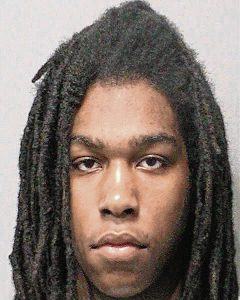
Kubacki went on to describe Stringer as impulsive, and while he understood there were allegations of abuse in his past, Stringer was struggling to take responsibility for what had happened. He also highlighted a history of disciplinary issues with Stringer at the Dickinson Juvenile Justice Center.
Kubacki also said Stringer may do it again, which led to prosecutors asking for a sentence of 50 to 55 years minimum at the Indiana Department of Correction.
Defense attorney Drew Eggers described the entire situation as “senseless.” Stringer has mental health issues that need to be treated and is remorseful, Eggers said.
“I don’t think he had a malicious intent to kill,” Eggers said.
The comments Stringer made on the calls were when he was angry, Eggers said. He asked the court to give Stringer a chance for rehabilitation, later saying that he had seen Stringer change over the months he got to know him.
Eggers ultimately asked that Stringer be put in a juvenile IDOC facility to receive treatment, also requesting he be given a minimum sentence of 45 years with the opportunity to ask for modification.
In response to this, Kubacki told the court that the comments made by Stringer were from recent months, including May and July. He also said they would be opposed to any modification to the sentence, per the wishes of David’s family.
Before rendering Stringer’s sentence, Cummins acknowledged that neither David’s, nor Stringer’s, families would think the sentence was perfect.
Cummins acknowledged Stringer’s past, but said it wasn’t an excuse to shoot someone.
“There’s people who’ve gone through similar things but didn’t kill people,” he said.


